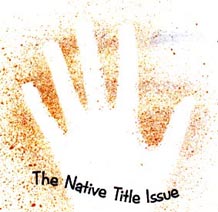
Environmental responsibilities and the proof of native title
by Jessica Weir, Research Officer
Native Title Research Unit, Australian Institute of Aboriginal and Torres Strait Islander Studies (AIATSIS)
In the 1992 Mabo decision the High Court determined that native title was the recognition in Australian law of the traditional rights and interests of Aboriginal and Torres Strait Islander people in land and waters. The source of native title, the traditional laws and customs, were recognised, not created, by the High Court and later were confirmed in the Native Title Act 1993 (Cth). Because the traditional laws and customs pre-exist the recognition in Australian law, they cannot be extinguished by the Courts. Native title, however, can be recognised or extinguished under Australian law.
In order to establish native title, applicants must show evidence that they have, and their predecessors had, an association with the area; that there exist traditional laws and customs that give rise to the claimed native title; and, that they have continued to hold the native title in accordance with those traditional laws and customs (Native Title Act s.62(e)).
Environmental responsibilities for country can be a part of the traditional laws and customs which form the proof of native title. Requirements for proof may include evidence of hunting and gathering, seed propagation, and fire management. In Mabo evidence was given of the traditional land tenure system of hereditary law related to garden plots. In the Croker Island case, which was the first native title determination over the sea, people described how their fishing practices related to their spiritual beliefs.In Yorta Yorta environmental management practises were relied on by the applicants as evidence of ongoing traditional laws and customs.
Environmental responsibilities are in many instances an important part of the proof of native title because of the relationship between such practices and the laws and traditions of Indigenous societies. Muir and Sutherland (2001) give examples from the Northern Goldfields region of Western Australia, where promoting seed growth, maintaining water sources, and selectively culling fauna are understood as the physical equivalent of cultural practices such as performing ceremonies or rituals, replenishing resources on a spiritual level, observing consumption taboos and kinship and community distribution rules.They write,
"The relationship between physical and cultural management is blurred, with the two methods constantly informing each other" (Muir and Sutherland 2001:25). The physical practice of environmental management can be appreciated as evidence of maintaining laws and customs, although artificial separation of physical and spiritual evidence can be an inhibiting factor in native title cases".
Muir, K., and J. Sutherland. 2001. "Managing Country: A Legal Overview," in Working on Country: Contemporary Indigenous Management of Australia's Lands and Coastal Regions. Edited by R. Baker, J. Davies, and E. Young, pp. 24-46. Melbourne: Oxford University Press.
About
the Native Title Research Unit
The Native Title Research Unit is located at the Australian Institute of Aboriginal and Torres Strait Islander Studies on Acton Peninsula, Canberra. The NTRU identifies pressing research needs arising from the recognition of native title, conducts relevant research projects to address these needs, and disseminates the results. In particular, we publish a regular newsletter, an Issues Papers series, and publications arising from research projects.
The NTRU organise and participate in conferences, seminars and workshops on native title and social justice matters. We aim to maintain research links with others working in the field. Our Newsletter, Issues Paper series, and conference information are all available from our Native Title Research Unit web page at www.aiatsis.gov.au.
The NTRU Access Service
The NTRU Access Officer accepts all requests for information about materials held at AIATSIS from people undertaking research for native title applications. Requests relate to a particular native title claim.
For researchers who know what material they need, and just require copies sent, we retrieve the material and organise any clearances and permission needed from depositors, the head of the Library, or the Principal of AIATSIS as necessary. For other clients who have not yet identified what material would be useful for them, we undertake research to compile specific bibliographies which identify relevant materials.
Many
clients like to come and visit the AIATSIS Library themselves to carry
out their research. We explain how to use the Library, retrieve any closed-access
materials and generally assist in research as needed. Contact the Access
Officer for information sheet on phone 02 6246 1103, fax 02 6249 7714,
or ntss@aiatsis.gov.au.
©
June 2002
